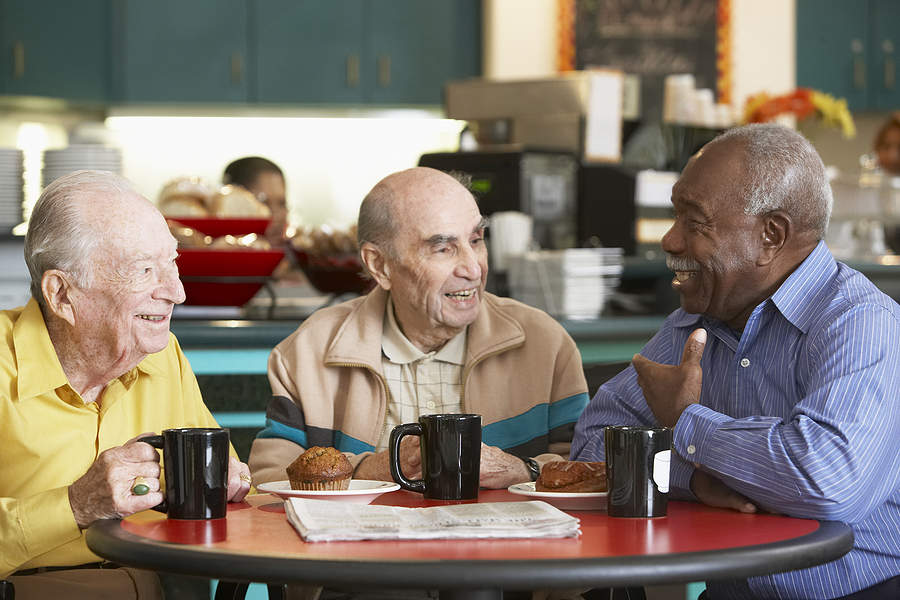In last week’s post, I talked about the ways a continuing care retirement community (CCRC, or life plan community) or other senior living community can appeal to both the introvert and the extrovert. This topic got me thinking about a somewhat related story I heard on NPR recently about how it can be difficult for adults to make new friends, especially as we grow older.
This is an important senior living topic to consider because social isolation, or a lack of interaction with friends and loved ones, is associated with poorer senior health.
>> Related: The Key Difference Between Social Isolation & Loneliness
An increasingly challenging predicament
Think back to your school years, from grade school through college, when you were constantly surrounded by a ready-made pool of potential friends. As the NPR story noted, during that phase of life, it was easy to find a person or people with whom you shared interests — people you “clicked” with.
But as we get older and venture out into the “real world,” making those types of connections can be more difficult. And different phases of adult life present their own unique set of challenges on this front.
Take your 30s and 40s, for example. During those decades of life, people are likely getting established in their careers, perhaps moving to a new city for a job or relationship, and often entrenched in childrearing. Making new friends may not be on folks’ already lengthy to-do list during this stage of life.
As we get older, the friend situation often does not improve, however. In fact, as the NPR story observes, it can be even more difficult to make new friends as we age, causing some people to become increasingly isolated as they grow older.
For some seniors, they have always relied upon their spouse or partner for social interactions; this is especially common for men. These social circles can be jeopardized if couples break up or if one partner passes away. Unfortunately, as we grow older, we also will lose friends to illness and old age. I was once talking with an older gentleman who solemnly observed, “If I want to visit my friends, I have to go to the cemetery.”
>> Related: Mind the Gap: Seniors with Nowhere to Turn for Support
A shrinking circle of friends
It can be difficult for many adults to “put themselves out there” for the formation of new friendships, especially for older men, says Dr. Marisa G. Franco, a psychologist, University of Maryland professor, and expert on the psychology of friendship.
Dr. Franco explains that people often will assume that someone they meet already has “enough friends,” and they will thus subconsciously close themselves off to the possibility that that person could become a new friend. This phenomenon is what she calls “covert avoidance.”
Dr. Franco notes that the challenges associated with making friends as we age can lead to a self-fulfilling prophecy of loneliness and isolation. “If you are in a place of loneliness, you are, according to the research, more likely to assume people are going to reject you. You’re just sort of hyper-vigilant for rejection and social threats. You’re more likely to think that social interactions will be more negative and less enjoyable,” observes Dr. Franco.
But the ironic twist of this situation is that as we grow older, we often increasingly need to rely on friends (and, of course, family) for assistance with certain tasks or chores. So just when people may need friends the most, they can be the hardest to come by.
>> Related: The Long-Term Impacts of Fewer Births and More Soloagers
Opening your heart and mind to new connections
What can adults do about the challenges we often face around forming new friendships as we grow older? Dr. Franco offers some advice.
- Be intentional about making new friends. As we get older, organic interactions (think: children on the playground or college students at the student union) become rarer, so you have to put in the extra effort needed to make and sustain a new friendship.
- Set up planned and regular get-togethers with a group of potential friends, such as a standing weekly coffee date or a monthly book club. Dr. Franco observes that “when we develop groups, our friendships are more sustainable than they are with individuals because there’s multiple touch points now.”
- Assume that people will like you. Fight the negative self-talk that says you might be rejected by a potential new friend, which can lead to covert avoidance.
- Ask for contact information when you feel like you connect with someone. And then take the next step and reach out to them!
- Keep putting yourself out there. If a connection doesn’t end up being the friendship match that you’d hoped, try, try again.
>> Related: CCRC Life Enrichment Programs Add Extra Value During Pandemic
Nurturing friendships at a CCRC
As I discussed in last week’s post about introverts and extroverts, moving to a CCRC or other senior living community can be an ideal way to make a wonderful network of new friends. Such communities actually facilitate and foster new friendships and camaraderie in a number of important ways.
For example, new resident ambassador programs and welcome committees not only get people acclimated to their new surroundings, they help introduce new residents to their neighbors. The dining experience at CCRCs and other types of senior living communities also is designed to nurture the formation and continuation of friendships. And there are other community design features intended to encourage social interaction and friendships too, like sidewalks and mailbox banks.
But perhaps the top way that communities like these enable new friendships to flourish is through their many events and group activities. Classes, hobby groups, volunteer projects, cultural outings, social events — all of these group settings are wonderful opportunities for residents to meet new prospective friends with shared interests and continue to nurture those friendships on a regular basis going forward, just as Dr. Franco suggests.
It is important to acknowledge that it’s easier for some people than others to adjust and make friends. Some new CCRC residents aren’t ready emotionally or mentally to start making friends; they may need a longer acclimation period, and that is perfectly normal. But this is the very reason why having new resident welcome programs is important.
>> Related: Another Study Finds Potential Health Benefits to Living in a CCRC
A bond for life
Humans are social creatures; we all need human contact in order to thrive. Indeed, countless studies have shown that social isolation can be detrimental to physical and mental wellbeing, especially among older people. By encouraging and nurturing friendships among residents, senior living communities like CCRCs can help their residents live happier, healthier lives, surrounded and supported by a group of caring friends.






